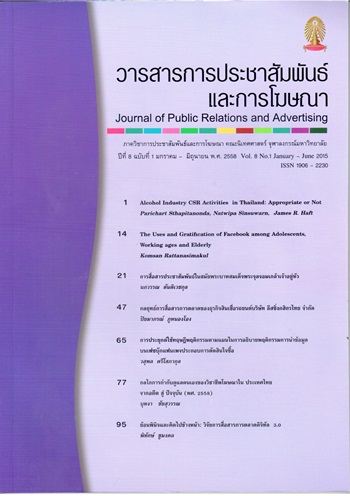ALCOHOL INDUSTRY CSR ACTIVITIES IN THAILAND: APPROPRIATE OR NOT
Main Article Content
Abstract
It is not easy to judge the appropriateness of a CSR project launched by the same multinational corporation in different countries. Ihlen, Bartlett, and May (2011) accept that CSR is recognized as a global phenomenon, however, they have observed that CSR programs, or CSR communication, cannot be applied in a “one-size-fit-all” approach at the global level.
A number of scholars have indicated CSR programs in different countries have their own uniqueness since they are shaped mainly by local contexts, ranging from historical and political to social and cultural contexts (Habisch & Jonker, 2005; Nyquist, 2003; Ihlen, Bartlett, & May, 2011). Furthermore, these CSR programs can indirectly reflect the ideology and characteristics of the sponsoring corporations.
This paper aims to examine CSR programs and communication of the alcohol industry in Thailand, where approximately 90 percent of the population is Buddhist. From the Buddhist perspective, alcohol consumption is a sin. However, from health statistics, alcohol has been a direct or indirect cause of premature death in many cases. Meanwhile, from the alcohol corporations' perspectives, it has become a very competitive market that has become even fiercer because of new legal restrictions.
With strict regulations on the prohibition of alcohol commercials, this research seeks to prove the assumption that CSR activities and communicating CSR to the mass market have become a growing trend of alcohol industry in Thailand. Documentary analysis has provided empirical data that on one hand shows alcohol companies in Thailand, local and multinational, allocating advertising budgets to integrated CSR campaigns, which takes the risk of penalties because of illegal promotional practices. The following results together with those of studies conducted elsewhere have led to debates on business ethics and the appropriateness of CSR and CSR communication as well as the implementation of proper rules and regulations. sumption is a sin. However, from health statistics, alcohol has been a direct or indirect cause of premature death in many cases. Meanwhile, from the alcohol corporations' perspectives, it has become a very competitive market that has become even fiercer because of new legal restrictions. With strict regulations on the prohibition of alcohol commercials, this research seeks to prove the assumption that CSR activities and communicating CSR to the mass market have become a growing trend of alcohol industry in Thailand. Documentary analysis has provided empirical data that on one hand shows alcohol companies in Thailand, local and multinational, allocating advertising budgets to integrated CSR campaigns, which takes the risk of penalties because of illegal promotional practices. The following results together with those of studies conducted elsewhere have led to debates on business ethics and the appropriateness of CSR and CSR communication as well as the implementation of proper rules and regulations.
The specific results of this research are as follows:
1) During 1999-2008, the Thai Alcohol Industry organized 436 CSR activities to communicate with the public via different channels, including mass media, organized public events, the internet and social media.
2) Based on Professor Kotler’s Concept of CSR, the Thai alcohol industry has mainly focused on corporate philanthropy (430 corporate philanthropic activities, or 86.5 percent of the total), followed by 60 cause-promotion activities (12.1 percent), 4 social responsible business practice activities (0.8 percent), and 3 cause-related marketing activities (0.6 percent). No corporate social marketing or community volunteer activities were recorded.
3) Among Thai youth, CSR activities were seen in a much more positive light by those who consumed a high level of alcohol when compared to those who were moderate consumers. However, non-drinking youth did not totally trust the alcohol industry in terms of their sincerity when promoting their CSR activities.
In addition, Thai youth, both drinkers and non-drinkers, indicated that they wanted to participate in CSR activities organized by alcohol beverage companies if allowed, especially when they believe that these CSR activities would benefit Thai society.
Based on the above data, the challenge for the alcohol industry is reframing their “CSR” activities in a manner that will exclude youth from access to alcohol products together with determining the right communication tactics for their CSR activities that are not viewed as marketing tools. Furthermore, health educators, policy makers, regulators and family members must be aware of and find ways to combat the unintended influence of CSR Activities upon youth to combat, or prevent, their attraction to alcohol products.


